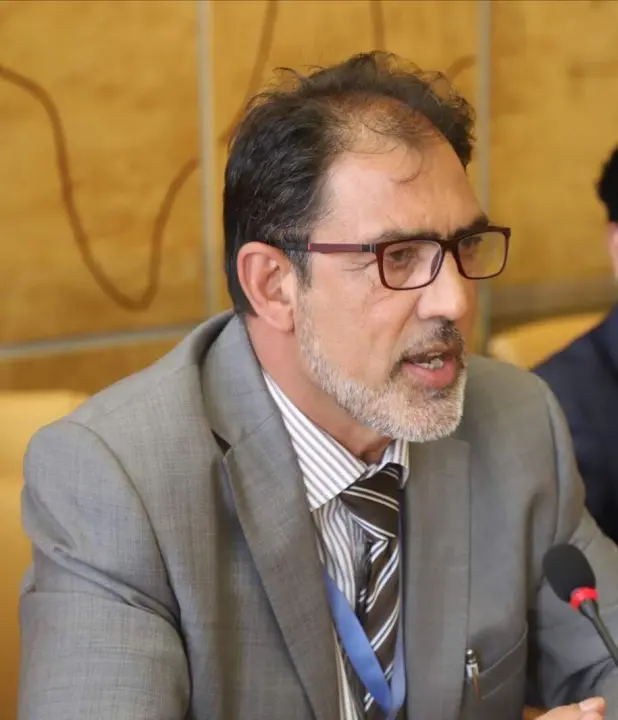Altaf Hussain Wani
Despite its international commitments to respect and protect basic human rights, the Indian state has stifled dissenting voices, curtailed media freedom, and criminalized independent journalism, particularly in Jammu and Kashmir.
Recently, the United Nations Secretary-General resorted to the rare diplomatic tool, Article 99 of the UN Charter, to draw the Security Council’s attention to the aggravated human rights situation in the Gaza territory of Palestine, emphasizing the urgent need for accountability. As we approach International Human Rights Day on December 10th, it is essential to reflect on the state of human rights enforcement and the accountability of states globally.
The day is dedicated to reaffirming our commitment to promoting respect for the rights and freedoms enshrined in the Universal Declaration of Human Rights (UDHR), adopted by the United Nations General Assembly in 1948. Over the years, the UDHR has paved the way for more than seventy human rights treaties, conventions, and protocols, including the International Covenant on Economic, Social and Cultural Rights (ICESCR) and the International Covenant on Civil and Political Rights (ICCPR).
This year’s celebration of the Universal Declaration of Human Rights emphasizes “Consolidating and Sustaining Human Rights Culture into the Future.” It serves as a reminder of our collective responsibility to support and safeguard human rights at all levels of society.
These documents not only acknowledge fundamental rights but also recognize all peoples’ right to self-determination, the right to determine their political status, and pursue their economic, social, and cultural goals.
By ratifying these covenants, an overwhelming majority of UN member states have committed to advocating for and adhering to human rights and freedoms for all individuals. The Universal Periodic Review (UPR) and the Complaint Procedure (CP) are mechanisms that assess and examine the human rights records of all UN members, ensuring the protection of people’s rights and freedoms.
Furthermore, the Human Rights Council (HRC) has been actively coordinating efforts to protect and promote human rights through education and awareness campaigns on human rights issues, raising global awareness about the existing human rights regime.
This year’s celebration of the Universal Declaration of Human Rights emphasizes “Consolidating and Sustaining Human Rights Culture into the Future.” It serves as a reminder of our collective responsibility to support and safeguard human rights at all levels of society.
While education and awareness play a critical role in fostering a rights-respecting society, they alone are insufficient to achieve the objectives outlined in these agreements. Establishing a solid human rights culture, where respect for human rights takes precedence over all else, requires holding human rights violators accountable for their actions.
Regrettably, there is currently no effective means or mechanisms in place to ensure that those who violate human rights are held responsible. In South Asia, India bears a significant responsibility for upholding human rights due to its size and claim to being the largest democracy. However, despite its international commitments to respect and protect basic human rights, the Indian state has stifled dissenting voices, curtailed media freedom, and criminalized independent journalism, particularly in Jammu and Kashmir.
The suppression of human rights activists, persecution of civil society, and undue restrictions on people’s rights to movement and freedom of speech have become commonplace. India, while boasting of its democratic and secular credentials on the global stage, unfortunately, has an alarming human rights track record.
Gaza residents inspect the ruins of an apartment destroyed by Israeli airstrikes. (Photo: Palestinian News & Information Agency (Wafa))
In Kashmir, every article and provision of the UDHR is being violated without any accountability or fear of international repercussions. To date, the international human rights regime lacks the authority to hold violators accountable, while powerful nations have weaponized it to advance their political and strategic interests.
It is imperative that influential governments acknowledge that lasting global peace is intrinsically tied to resolving age-old conflicts and recognizing the universally accepted principle of the right to self-determination. A sustained human rights culture cannot thrive in a vacuum. Selective justice, uneven law enforcement, and violations of citizens’ rights sow anarchy, lawlessness, instability, and political disorder.
To effectively implement international law and enforce the rights regime, we must: a) Strengthen the UN system,
b) Enhance the teeth of existing UN mechanisms and instruments to hold powerful actors accountable,
c) Establish robust and unwavering accountability at the highest levels, d) Coordinate efforts for peace building and mobilize political will to resolve long-standing conflicts that fuel rights violations,
e) Ensure effective monitoring and comprehensive documentation of human rights violations and abuses, whether committed by individuals, groups, or states.
The world must recognize that human rights are not a luxury but an essential foundation for peace, stability, and justice. On this International Human Rights Day, let us pledge to uphold the principles of the Universal Declaration of Human Rights and work tirelessly to establish effective accountability mechanisms that will ensure a better world for all.
[The writer is Chairman of Kashmir Institute of International Relations]









